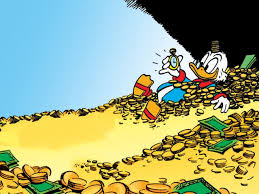Friday, October 31st, 2014
jamie merrill, - The Independent (U.K.)
The number of billionaires has doubled since the start of the financial crisis, according to a major new report from anti-poverty campaigners. According to Oxfam, the world’s rich are getting richer, leaving hundreds of millions of people facing a life “trapped in poverty” as global “inequality spirals out of control”.
The report found that the number of billionaires in the world has more than doubled to 1,646 since the financial crisis of 2009, and Oxfam says is evidence that the benefits of a return to economic growth are “not being shared with the vast majority”.
The influential report is supported by Bank of England chief economist Andrew Haldane and Nobel Prize-winning economist Joseph Stiglitz. It notes that since 2009 one million women have died in childcare due to lack of basic health care, and that 57m children are currently missing out on any form of […]
Friday, October 31st, 2014
Danielle Kurtzleben, - Vox
 Nearly 44 percent of all US kids were in poverty for two or more months from 2009 to 2012, the Census Bureau reported on Wednesday.
Nearly 44 percent of all US kids were in poverty for two or more months from 2009 to 2012, the Census Bureau reported on Wednesday.
Poverty is unevenly spread, and for many college-educated, urban-dwelling, well-to-do Americans can be almost entirely hidden. It might be that none of the kids in your neighborhood or church or school district were in poverty during this period. But that means that there’s some other neighborhood where many — even most — of the kids were. And this is just the beginning of the staggering figures on US child poverty.
Nearly 3.2 million kids were in poverty throughout the downturn
Of course, those nearly 44 percent of kids weren’t in poverty that whole time. It includes lots of kids who entered and exited poverty over that period. But narrower poverty measures also show staggering numbers. For example, the average monthly poverty rate for US kids was 24.2 percent in 2012. The number of kids in poverty for all of 2012 was 9.5 million — that’s 12.9 percent of all American kids. And 4.4 percent — […]
Friday, October 31st, 2014
John Cassidy, Staff Writer - The New Yorker
At this late stage in the prostitution, cretinization, and putrefaction of the American political system, it’s hard to get worked up about anything, and that, doubtless, explains why most voters aren’t paying much attention to the midterm elections. Or, rather, they are trying to pay no attention. If you are unfortunate enough to live in one of the states or districts where there is a close contest, you can’t escape so easily. Anytime you switch on your television or radio, you are pretty much guaranteed to be bombarded with the enervating output of political admen, spin doctors, and negative-research shops for whom this is, first and foremost, a profit-making industry.
Pity, for example, the unfortunate citizens of Colorado, where there are two competitive races this year—one for U.S. Senate and one for the governorship. In the Senate contest, polls show Cory Gardner, a Republican congressman, with a narrow lead over the Democratic incumbent, Mark Udall. The Gardner campaign and its allied super PACs have followed the same script that Republicans have […]
Friday, October 31st, 2014
Claire Cain Miller, - The New York Times
America’s slow and expensive Internet is more than just an annoyance for people trying to watch “Happy Gilmore” on Netflix. Largely a consequence of monopoly providers, the sluggish service could have long-term economic consequences for American competitiveness.
Downloading a high-definition movie takes about seven seconds in Seoul, Hong Kong, Tokyo, Zurich, Bucharest and Paris, and people pay as little as $30 a month for that connection. In Los Angeles, New York and Washington, downloading the same movie takes 1.4 minutes for people with the fastest Internet available, and they pay $300 a month for the privilege, according to The Cost of Connectivity, a report published Thursday by the New America Foundation’s Open Technology Institute.
Thursday, October 30th, 2014
Hasnain Kazim, - Der Spiegel (Germany)
Interview Conducted by Hasnain Kazim
How does Islamic State think? How do its followers see the world? SPIEGEL ONLINE met up with an Islamic State recruiter in Turkey to hear about the extremist group’s vision for the future.
The conditions laid out by the Islamist are strict: no photos and no audio recording. He also keeps his real name secret as well as his country of origin, and is only willing to disclose that he is Arab. His English is polished and he speaks with a British accent.
He calls himself Abu Sattar, appears to be around 30 years old and wears a thick, black beard that reaches down to his chest. His top lip is shaved as is his head and he wears a black robe that stretches all the way to the floor. He keeps a copy of the Koran, carefully wrapped in black […]














